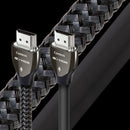Description
Audioquest Carbon 48 Gbps HDMI Cable
Carbon HDMI adds 5% silver-plating to its predecessors' solid-core conductors. Like all AudioQuest HDMI cables, Carbon uses Solid High-Density Polyethylene Insulation, and precise geometry. Specific attention has been paid to maximizing the performance of HDMI, and indeed, AudioQuest's HDMI cables push sonic performance to new levels.
Available lengths: 0.6m, 1m, 1.5m, 2m, 3m
Features:
- 4K/8K
AudioQuest 18Gbps High Speed HDMI cables have the bandwidth required for video up to 8K/30 (8-bit, 4:2:0), which is 7680 x 4320 resolution (over 33 million pixels) at up to 30 frames-per-second (fps). 24 and 30 fps are the frame rates for almost all movies and many TV shows.
- 18G
All AudioQuest 18Gbps High Speed HDMI cables are guaranteed to have the 18Gbps bandwidth required for compelling features like 8K/30 video, HDR (High Dynamic Range) imagery, and eARC (enhanced Audio Return Channel).
- eARC
HDMI hardware’s previous ARC capabilities max out at lossy (compressed) 5.1-channel surround sound. Not only do all generations of AudioQuest HDMI cables “with Ethernet” support ARC, but in order to ensure superior audio performance, the ARC-channel conductor-pair is internally controlled for direction, running in the opposite direction from the 4 pairs that carry information to the TV. Upcoming HDMI 2.1 hardware supports Enhanced Audio Return Channel (eARC), which increases bandwidth dramatically to support uncompressed and lossless high-resolution multichannel audio, including Dolby TrueHD and Atmos, and DTS-HD Master Audio and DTS: X. All AudioQuest HDMI cables “with Ethernet” have the conductors and bandwidth required for eARC’s enhanced sonic capabilities.
- HDR
AudioQuest 18Gbps High Speed HDMI cables support High Dynamic Range (HDR) and Dynamic HDR. HDR content expands the contrast of the image for blacker blacks and brighter whites/highlights as well as greater color saturation and brightness. Dynamic HDR (HDR 10+ and Dolby Vision for example) enables frame-by-frame HDR optimization rather than HDR settings that are fixed for the entire program.
- SOLID 5% SILVER CONDUCTORS
Solid conductors minimize the harmful effects of both electrical and magnetic strand-to-strand interaction. For digital cables, whose signals are of such high frequency that they travel almost exclusively on the surface of the conductor, increasingly thick layers of silver plating are applied to AudioQuest’s Long-Grain Copper (LGC) conductors to further improve Noise-Dissipation. Placing the superior metal on the outside of the conductor produces the greatest benefit on overall performance—a superbly cost-effective way to maximize a digital cable.
- DIRECTIONALITY-HDMI
All audio cables are directional. The correct direction is determined by listening to every batch of metal conductors used in every AudioQuest audio cable. All signal conductors controlled for digital-audio direction in AudioQuest HDMI cables, and care is even taken to run the conductors used in the Audio Return Channel in the opposite direction to ensure the best performance for that application. Arrows are clearly marked on the connectors to ensure superior sound quality.
- HARD-CELL FOAM INSULATION
Hard-Cell Foam (HCF) Insulation ensures critical signal-pair geometry. Any solid material adjacent to a conductor is actually part of an imperfect circuit. Wire insulation and circuit board materials all absorb energy. Some of this energy is stored and then released as distortion. Hard-Cell Foam Insulation is similar to the Foamed-PE used in our more affordable Bridges & Falls cables, and is nitrogen-injected to create air pockets. Because nitrogen (like air) does not absorb energy and therefore does not release any energy from or into the conductor, distortion is reduced. In addition, the stiffness of the material allows the cable's conductors to maintain a stable relationship along the cable's full length, producing a stable impedance character and further minimizing distortion.
- HIGH SPEED DATA CAPACITY
HDMI standards and capabilities have improved significantly since DVI first evolved into HDMI. All generations are backward compatible. However, not all previous HDMI cables can transmit the full 18Gbps of data required to optimize today’s HDMI 2.0 equipment. While there is currently no 4K/60 4:4:4 software requiring the full 18Gbps capability of HDMI, some sources (UHD Blu-ray players) can be set to “up-sample”, requiring 18Gbps capability. Up-sampling often should be done in the TV rather than in a previous component — but that’s your decision. AudioQuest HDMI cables with "Exceeds 18 G bps" on the box front are guaranteed to exceed the requirements for all possible HDMI data streams.
- CARBON-BASED 3-LAYER NOISE-DISSIPATION SYSTEM (NDS)
It's easy to accomplish 100% shield coverage. Preventing captured Radio Frequency Interference (RFI) from modulating the equipment's ground reference requires AQ's Noise-Dissipation System (NDS). Traditional shield systems typically absorb and then drain noise/RF energy to component ground, modulating and distorting the critical "reference" ground plane, which in turn causes a distortion of the signal. NDS's alternating layers of metal and carbon-loaded synthetics "shield the shield," absorbing and reflecting most of this noise/RF energy before it reaches the layer attached to ground.


